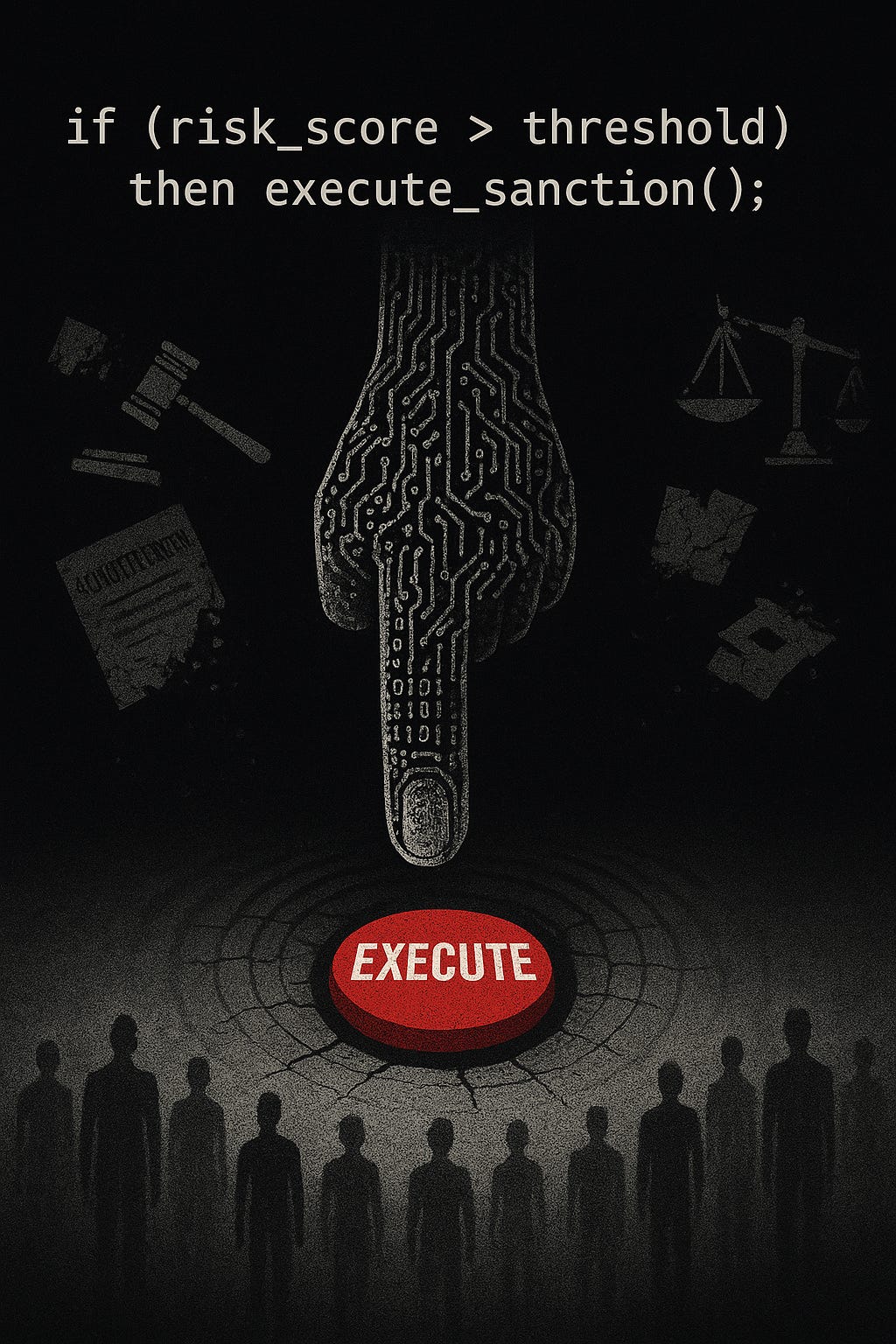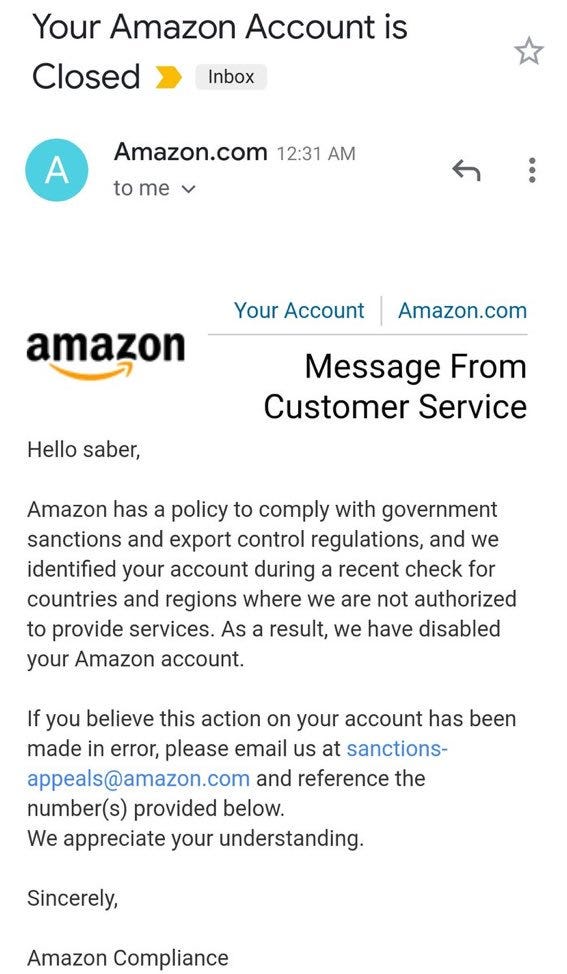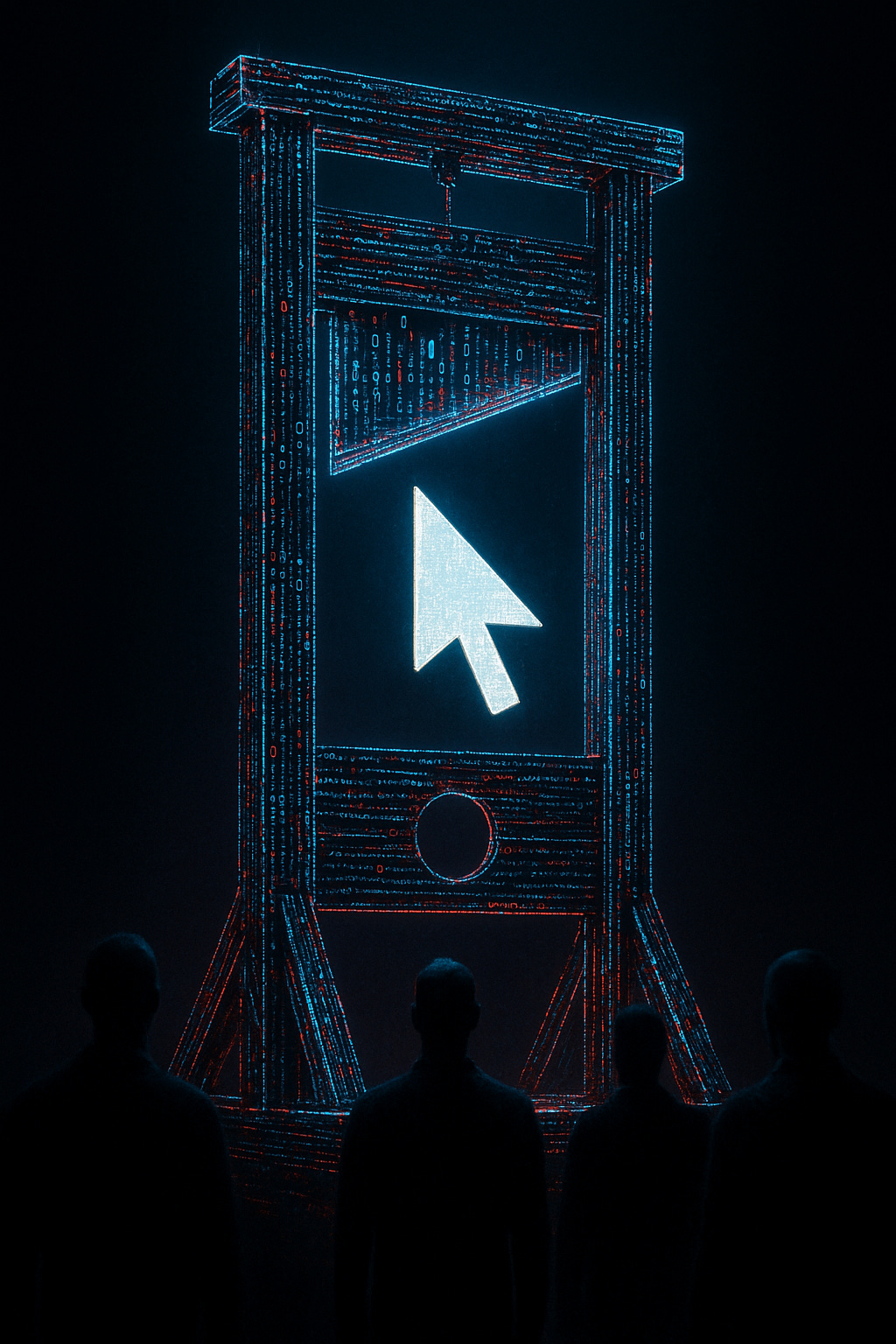Algorithmic Execution
“And he causeth all, both small and great, rich and poor, free and bond, to receive a mark in their right hand, or in their foreheads: and that no man might buy or sell, save he that had the mark, or the name of the beast, or the number of his name.” Revelation 13:16-17
For most of human history, tyranny was an inefficient business. Dictators needed armies, police, informants, armies of human accomplices willing to enforce their will. Human frailty meant mistakes, hesitation, and resistance but the rise of digital governance has solved the “messy human” problem. Today, control is executed not through bayonets and batons, but through the quiet tyranny of code.
Modern life runs on a digital nervous system: payment processors, communication platforms, transport apps, cloud servers, employment databases. These systems are the infrastructure of survival and they can be switched off with a single keystroke. This is algorithmic execution; the silent, instantaneous annihilation of your agency, your access, your voice. The more dependent you become on digital infrastructure for basic survival, the more vulnerable you become to algorithmic decapitation.
No soldiers, no arrests, no trials. Just Click
Your life ends. Not your biological life, of course. That would be crude, obvious, legally problematic. No, the tech overlords have discovered something far more elegant: the systematic murder of your agency, your autonomy, your capacity to exist as a free human being in the digital age.
The Execution Protocol
Refuse their vaccine? Click. The code executes instantly, silently, automatically. Your QR code stops working. Travel applications return error messages. Your employer's system flags you as "non-compliant" for unspecified health requirements. Your bank account shows "temporary restrictions" for undefined policy violations. Your children's school enrollment status shifts to "under review."
Break their lockdown? Click. Your geolocation data triggers automated responses. Your mobility score drops. Your social credit rating adjusts. Access to public transportation requires additional verification that never quite processes. Ride-sharing applications experience persistent technical difficulties. Vehicle insurance premiums mysteriously spike due to "updated risk assessments." The algorithm has assassinated your freedom of movement without firing a shot.
Criticize an official narrative? Click. Your content reach vanishes into the digital void. Posts receive the kiss of algorithmic death; visible to you, invisible to others. "Freedom of speech, not reach," they said. Your audience dissolves not through choice but through code. Your voice is silenced through shadow-banning, your influence reduced through engagement throttling, your reach assassinated through content suppression algorithms that ensure your words die in the digital abyss.
You can still speak. You simply cannot be heard. Freedom of speech, not reach they said.
Say something "offensive"? Click. Your reputation score plummets through automated sentiment analysis. Employment prospects wither as HR algorithms flag your social media history. Insurance rates adjust based on psychological risk assessments derived from your digital footprint. Dating prospects vanish as matching algorithms deprioritize profiles with low social scores. By the way, they get to decide what's offensive
The COVID-19 plandemic demonstrated this dynamic in real time, as public health measures initially presented as temporary and limited gradually expanded to encompass broader categories of social and political dissent. Questioning vaccine efficacy, expressing skepticism about lockdown policies, or sharing information about natural immunity shifted from legitimate scientific discourse to "misinformation" subject to censorship and social sanctions.
In this system, you are not a citizen with rights but you are User ID 8847392847, Risk Score 7.3, Compliance 64%, flagged Potential Dissident. Whether you can buy, sell, travel, or speak depends entirely on the algorithm’s verdict.
The Architecture of Digital Feudalism
The trajectory we're on leads inexorably toward a neo-feudal society where a small technological aristocracy controls the digital infrastructure that determines who can participate in modern life. These new lords of the algorithm hold power not through land ownership or military force, but through control of the code that mediates human interaction, the platforms that enable communication and commerce, and the data systems that store the accumulated knowledge of human civilization.
We can observe this feudal structure crystallizing in real time through the transformation of what were once open, collaborative platforms into centralized systems of control and extraction.
GitHub exemplifies this transformation. What began as a decentralized bazaar where programmers could freely share code and collaborate across geographic and political boundaries has become a centralized refinery where contributions are harvested as training data for proprietary AI systems. Under Microsoft's ownership, every repository, every commit, every collaborative interaction serves dual purposes: facilitating development work and generating value for machine learning models that are then sold as subscription services.
Developers contribute expertise freely, believing they're building shared infrastructure. Meanwhile, corporate platforms extract massive commercial value from these unpaid contributions. The result? Surveillance capitalism applied to knowledge work. After the recently announced resignation of Github’s CEO, Thomas Dohmke, and the subsequent decision to absorb it into Microsoft’s CoreAI team, this trend is likely to accelerate.
The evidence of this systematic execution is already abundant and documented. In 2019, GitHub blocked users in sanctioned regions; Iran, Syria, Crimea, and later Cuba and North Korea and cut off entire populations from access to their own code because of political directives. Overnight, developers who had contributed to global open source projects for years discovered they could no longer access their own repositories, collaborate with international colleagues, or contribute to the digital commons that they had helped build.
In 2020, GitHub removed the youtube-dl project after a DMCA takedown by the Recording Industry Association of America, demonstrating how a single complaint could erase infrastructure used globally. The project was eventually restored after public outcry but the damage was done.
The 2022 Tornado Cash incident revealed even more clearly how political considerations could override technical and legal nuance. GitHub removed repositories and contributor accounts linked to the cryptocurrency mixing project after OFAC sanctions, only restoring read-only access after legal guidance clarified the distinction between sanctioning individuals and sanctioning code.
These incidents are not edge cases or unfortunate accidents. They represent the systematic architecture of control that transforms open source infrastructure into a mechanism for enforcing political compliance. A Nostr based alternative is long overdue.
The Walled Gardens of Silicon Valley
Your smartphone is not just a gadget but it’s your gateway to the modern economy, your public square, your library, your map, your wallet, and your printing press. Control over what runs on your phone is control over what you can say, see, trade, and build. Yet two corporations,Apple and Google, command over 99% of smartphone app distribution outside China. If your app is removed from both stores, it's effectively erased from public life.
These purges aren't theoretical: Parler was removed overnight in 2021. Fortnite was banned for bypassing Apple's 30% tax. Privacy tools and crypto mixers get throttled for "policy violations." Elon Musk recently accused Apple of manipulating App Store rankings to kneecap OpenAI competitors, conveniently after Apple partnered with OpenAI to integrate ChatGPT into its devices. Whether Musk's claims prove true, the mere plausibility of such algorithmic gatekeeping exposes the fragility of our supposedly "open markets" in mobile software.
Probably the most insane example of them all is Google’s recently introduced policy that exemplifies this "regulation by commercial enforcement”, which forces Bitcoin wallet developers to obtain expensive financial licenses despite legal distinctions between non-custodial wallets (which never touch your money) and custodial exchanges. In the United States, Google demands developers register as Money Service Businesses with FinCEN and comply with Anti-Money Laundering, Counter Terrorist Financing, and Know Your Customer regulations.
This goes well beyond legal requirements, that FinCEN's own 2019 guidance explicitly distinguishes non-custodial wallets from money transmitters, recognizing they don't qualify for MSB registration. Yet Google's policy ignores this legal reality, creating compliance burdens that would bankrupt most independent developers.
EU developers have not been spared either and are required to obtain MiCA licenses designed for exchanges and trading platforms, effectively banning all independent Bitcoin wallets from European Android devices.
This regulatory overreach reveals the evil genius of the app store model; censorship happens invisibly. There is no heavy-handed state ban with court orders and headlines. Instead, an algorithm simply does not recommend your app. A review team rejects your update for a vague policy violation. Your search ranking mysteriously plummets. You do not get banned from the public square; you simply become invisible in it.
The solution to the app store problem is not to plead with Apple or Google to “be fair”, it is to route around them. Since these platforms are private property, they're free to do as they wish, but as long as your phone runs their software, you're chained to their rules. Any "disruptive" apps built on iOS or Android exist at the pleasure of Apple and Google, thus creating a fundamental contradiction; you can't build independence using dependent infrastructure.
This is why alternative mobile operating systems like GrapheneOS matter, as well as embracing Progressive Web Apps that bypass app stores entirely, building alternative marketplaces like F-Droid, creating decentralized discovery protocols where users, not corporations, decide what is “safe” or “recommended,” and adopting operating systems that put the user, not the vendor, in ultimate control.
When AI Rewrites History
The Internet Archive is not just another website. It is the collective memory of the digital age; one of the last safeguards against historical amnesia. For journalists, historians, and researchers, it is an irreplaceable forensic tool because it preserves deleted posts, vanished news articles, and embarrassing corporate statements that PR departments would rather the world forget. It locks truth in place, beyond the reach of revisionists. As the unassuming librarian of the internet, it keeps the receipts.
And yet, it can be silenced with a single command.
Twitter has already blocked it. Reddit is now following suit. Tomorrow, it could be Facebook, YouTube, or any other gatekeeper of online discourse. The reason is painfully simple: the Internet Archive is centralized. Every time you request an archive, the process runs through a single, identifiable infrastructure. Governments, corporations, or platforms don’t need to censor you, all they have to do is choke off that one point of access.
This is the fatal flaw of centralization. It turns the very pillars of our public record into single points of failure. One server farm. One court order. One corporate decision. And an entire historical record can vanish
The danger goes beyond deletion. In a future where the Archive is hobbled, AI won't just generate content but it will regenerate history itself. Without immutable records, AI systems can "hallucinate" pasts that never existed or "correct" inconvenient truths into sanitized narratives. Censorship won't be about silence but it will be about substitution.
The Bitcoin Response: Economic Sovereignty as Resistance
This context explains why Bitcoin represents something far more significant than an alternative investment vehicle or speculative financial instrument. Bitcoin embodies a fundamental challenge to the infrastructure of algorithmic execution by providing a means of economic participation that doesn't require permission from centralized authorities, approval from compliance departments, or submission to identity verification systems that enable surveillance and control.
The significance of Bitcoin lies not in its price appreciation or its potential to disrupt traditional banking, but in its demonstration that it's possible to create economic systems that operate outside the control mechanisms that enable algorithmic execution. When you control your own private keys, when you can transact peer-to-peer without intermediaries, when your financial activity can't be trivially monitored and controlled by hostile algorithms, you maintain a crucial space for autonomous action that doesn't depend on the good graces of corporate platforms or government agencies.
Bitcoin's importance extends beyond its function as money. It serves as a proof of concept for decentralized systems that resist capture by centralized authorities, that continue operating despite attempts at regulation or suppression, and that empower individuals to interact economically without requiring permission from intermediaries who might use that permission as leverage for political control.
The distinction is crucial: true sovereignty requires digital money operating through censorship-resistant protocols that don't require identity verification and can't be controlled by any single entity. The test is simple; does it require accounts, identity verification, or permission from centralized providers? If yes, it participates in surveillance infrastructure enabling algorithmic execution.
Bitcoin eliminates this identification layer entirely. Your private key provides cryptographic proof of coin control without proving who you are as a person. This isn't technical detail, it's a philosophical revolution separating the right to act from the requirement to be known.
The decisions we make today about which systems to build, support, and use will determine whether future generations inherit tools that enhance human capability and freedom, or tools that constrain human possibility within parameters defined by algorithmic logic.
The choice is ours, but it will not remain available indefinitely. The infrastructure of algorithmic control becomes more comprehensive and inescapable each day. The technical, economic, and social barriers to building alternatives increase as more human activity becomes dependent on centralized platforms and services.





